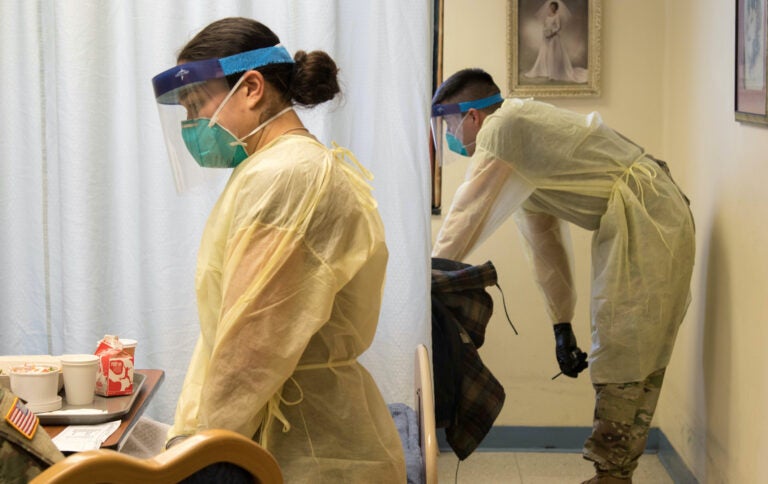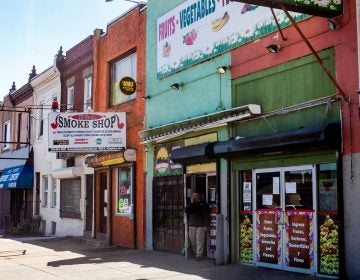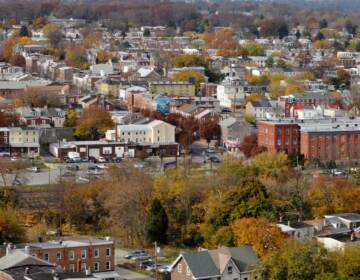Pa. coronavirus recovery: Philly presses pause on reopening restaurants, gyms
COVID-19 cases continue to rise nationwide and regionally; that’s true in Philly as well, which is now averaging about 100 new cases a day.

Soldiers from the National Guard tend to COVID-19 patients. (National Guard photo by Army Spc. Samuel D. Keenan)
Updated at 5:10 p.m.
–
Are you on the front lines of the coronavirus? Help us report on the pandemic.
On Tuesday, the Pennsylvania Department of Health reported 86,606 coronavirus cases since the COVID-19 pandemic began, and 6,649 deaths.
As of Monday, Philadelphia’s Department of Public Health has reported 25,991 cases and 1,579 deaths.
Philly presses pause on reopening restaurants, gyms
COVID-19 cases continue to rise nationwide and regionally; that’s true in Philly as well, which is now averaging about 100 new cases a day. The increase in cases is also higher in younger populations, with teenagers and young adults accounting for 34% of coronavirus cases when previously they were only 20%.
That means the county hasn’t met all of its targets for full reopening. So on Friday, Philadelphia will be moving to “green” on the state’s tiered reopening scale as previously scheduled — but with key restrictions.
Gyms and fitness centers will remain closed, and the city’s bars and restaurants will not be permitted to offer dining indoors. Museums, libraries, indoor shopping malls, and casinos will be allowed to reopen with mandatory mask usage and maintained social distance between patrons; no food, drink, or smoking indoors will be allowed. Outdoor gatherings of up to 50 people are allowed as well.
All activities must follow the city’s safe mode guidance.
“We will pause these activities until August 1, but we will re-evaluate weekly,” Health Commissioner Tom Farley said Tuesday.
He added that if cases continue to rise in Philadelphia, “it is possible that we will have to backtrack, and close activities that we are currently allowing.”
“It was a difficult decision,” said Health Commissioner Tom Farley Tuesday, citing the importance of weighing both economic and health effects of potential reopening. “The virus kills, but poverty kills too.”
“Nothing has changed about the virus, nothing has changed about the human body since March. The only thing that’s going to change is how we behave.”
Philly police required to wear masks, but not all officers comply
Just last Friday, Mayor Jim Kenney and Commissioner Farley issued an executive order requiring the use of face coverings in all indoor settings, as well as any outdoor settings in which individuals could not maintain a distance of 6 feet or more. Scientific research indicates that masks are critical in catching potentially viral droplets and stopping the spread of COVID-19.
But some Philadelphians are wondering: if they’re required to wear masks, why don’t they see local law enforcement doing so, too?
Philadelphia’s police officers have been given multiple directives to wear face coverings while on duty, city Managing Director Brian Abernathy said Tuesday. That’s corroborated by statements from Police Commissioner Danielle Outlaw as early as April, saying that cloth masks had been distributed throughout the department.
When pressed on the question, Abernathy said he understood why reporters might be upset, but said the city police force was a “microcosm of society.”
“Just as there are people that don’t want to wear masks, I have officers that don’t want to wear masks,” he added.
Philly police officers have also taken arrested or detained protestors’ masks in the past, according to WHYY reporter Avi Wolfman-Arent, who was arrested in May while covering a protest.

Get daily updates from WHYY News!
More aid, support services for long-term care patients
Starting July 1, Pennsylvania’s Department of Human Services will begin distributing more than $400 million of support to aging Pennsylvanians or those with disabilities who receive long-term care.
The distribution comes two weeks after Gov. Tom Wolf announced people with intellectual disabilities and autism, as well as their support providers, would receive $260 million in CARES Act funding.
The $400 million includes $245 million to nursing facilities, $140 million to personal assistance service providers, $50 million to assisted living residences and personal care homes, $8 million to providers with patients who specifically require ventilator or tracheostomy care, and more.
“I want to be very clear: COVID-19 remains an especially serious threat to individuals with disabilities,” Department of Human Services Secretary Teresa Miller said Tuesday, encouraging Pennsylvanians to continue wearing masks and practice social distancing in order to protect “those we know, and those we don’t.”
Although congregate settings like nursing homes and immediate care facilities are particularly vulnerable to the spread, none of the residents who live in Pennsylvania’s four state centers for people with intellectual disabilities have tested positive.
Deputy Secretary Kristin Ahrens pointed out that the majority of congregate-setting cases so far have been located in Southeast Pennsylvania, where the state had its largest outbreak, compared to other state-operated facility outbreaks in New Jersey and Illinois, and added that the key factor of concern appeared to be location and prevalence of cases in the region.
Curious about COVID case rates? See the data for yourself
The Department of Health just launched an online “early warning monitoring system dashboard” that provides information about COVID-19 prevalence across the state.
The dashboard, which maps data by county, includes number of cases, hospitalization count, and available ventilators. Its second page shows changes to these average daily numbers, compares the past seven days with the week previous, and displays arrows showing whether that comparison indicates an increasing or decreasing case rate, incidence rate, and more.
“This dashboard provides the entire community with early warning to changes in COVID-19 infection so that we can take action to prevent spread,” Health Secretary Dr. Rachel Levine said. “Recent increases in COVID-19 cases in parts of the state have shown the need for Pennsylvanians to continue to take simple steps to prevent the spread of this virus.”
The dashboard will be updated on a weekly basis.
WHYY is your source for fact-based, in-depth journalism and information. As a nonprofit organization, we rely on financial support from readers like you. Please give today.




![CoronavirusPandemic_1024x512[1]](https://whyy.org/wp-content/uploads/2020/03/CoronavirusPandemic_1024x5121-300x150.jpg)



